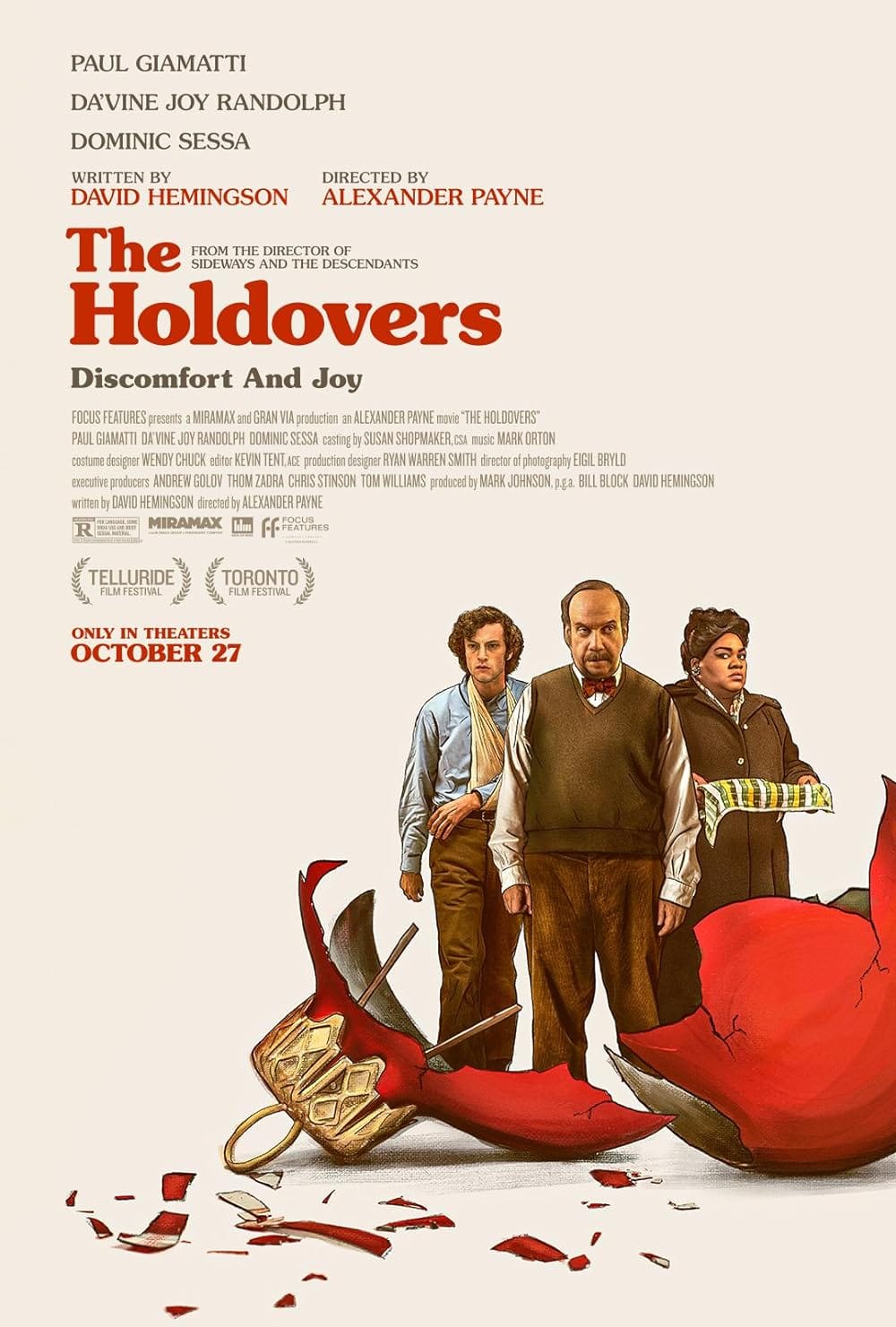The Holdovers
Familiar, but nice.

A curmudgeonly instructor at a New England prep school must remain on campus during Christmas break to babysit a handful of students with nowhere to go. Due to some unexpected events, he finds himself stuck with only the school's head cook and a troubled teen abandoned by his family. Over the course of the holidays, they all learn a little bit about themselves… and each other.
Before we get into talking about this film, let me first just say that I am shocked that Director Alexander Payne’s career somehow managed to survive the fallout from that terrible piece of shit that was the movie Downsizing.
Anyway…
It’s December, 1970, and Paul Hunham is a professor at the prestigious Barton Academy. Paul is the definition of a curmudgeon. The Administration doesn’t like him. The faculty doesn’t like him. The students don’t like him. He’s generally shabby, lives in dust and filth, and is surrounded only with books. He’s pompous, off-putting, belligerent, sneeringly condescending, and is always ready to abuse whatever meager power he might possess. He’s also walleyed, and smells like fish, but that’s due to a medical issue.
Every holiday break at Barton Academy, there’s always a few kids who have to stay on campus for one really sad reason or another, and because of this, each year a teacher is required to stay as well. Much to the disappointment of the poor students left behind this year, that duty falls to Mr. Hunham.
It’s at this point that fate intervenes, and all of the students are able to go somewhere for Christmas except for one. Angus is an acerbic and angry 15-year-old whose Mom didn’t want him to come home so that she could go to a tropical island with her new husband. The only other person on campus is the head cook Mary, a woman currently dealing with her grief over having recently lost her son in Vietnam. Together, they’re three very lonely and very alone people, who don’t realize how much they need each other… until they experience the healing power of friendship.
In a nutshell, The Holdovers is a film about loneliness, found families, and the need for human connection. It’s a film above love and understanding. It’s a film about being there for each other, and it’s also a film about endings and that melancholy gray space, as empty as a winter field, before the start of a new beginning, that is as fresh as newly fallen snow.
I joke, because more than anything, The Holdovers is a very familiar story that does exactly what you expect it to do.
Still, despite this, it’s a good enough film.
Good enough.
Giamatti’s irascibility as Paul Hunham is fantastically entertaining, and Randolph as Mary throws some dry side-eyed punchlines that are total killers. And when the film calls for emotion, these two bring the thunder, both the noisy crash variety, and the quiet rumble kind too. Meanwhile, Dominic Sessa as young Angus is more than able to keep up with them. Together, they make the very familiar twists and turns of this script worth watching.
A multiple Oscar nominated picture—for Best Picture, Best Actor for Paul Giamatti, Best Supporting Actress for Da’Vine Joy Randolph, Best Original Screenplay, and also Best Film Editing—The Holdovers is sweet, but never too overly-cloying. It’s touching too, but not too overdone. The performances are truly stellar, but otherwise, the film has no real surprises.
Which is the main problem… the film is so familiar. It’s up for Best Original Screenplay, but I swear, I’ve either seen this Afterschool Special before, or I read the book for a High School English class assignment. Probably not, I assume, but there’s just no escaping the feeling that we’ve all seen this film before. But to Payne’s credit, he’s obviously aware of this, seeing as how he bookended the film in credits done in the same style as films from the 70s, and otherwise, mostly just stays out of the way and simply presents the very simple story as is.
If I had one complaint, besides the fact that it’s all a bit rote, the snow globe didn’t quite land for me. I think it would’ve worked much better had the object in question come from Paul, instead of just having been picked up at a certain point in the story. You could see that it was going to be important by how it’s focused on at the party, but after that, it was really never mentioned, or shown again, not until the reveal at the end. I suppose you could say that the fact it was taken at the party was meant to imply that Paul was responsible (“but for his actions…”), but the reveal had no oomph at all. It felt too indirect and too unconnected to the rest of the story for me.
But whatever, that’s a minor issue for a minor film. Other than that, it’s good enough. Not great, but good enough.
